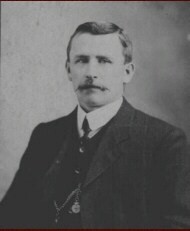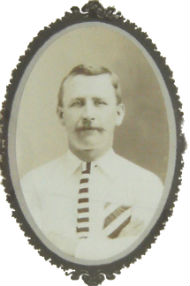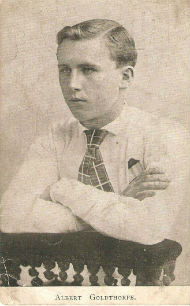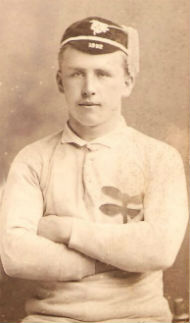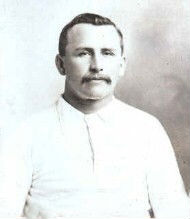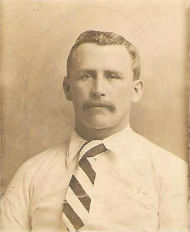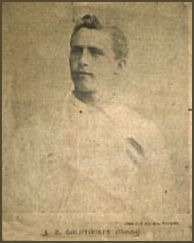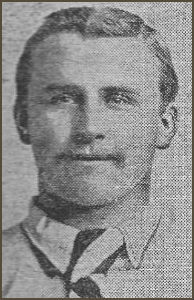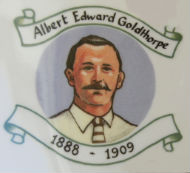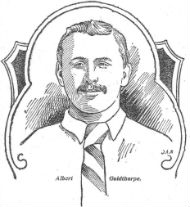In Honour of Albert Goldthorpe
This is the transcript of a short talk given by Tony Collins at the 2009 Albert Goldthorpe award ceremony.
I just want to spend a few minutes talking about Albert Goldthorpe and why he was not only an immortal player, but in many ways represents the very soul of rugby league.
There can be no doubt that he was a very great player, both under rugby union rules before 1895 and then under rugby league rules after the great split.
He made his debut for Hunslet aged 16 in October 1888 at full back. He was, reported the Leeds Mercury, 'properly put to the test and came through the ordeal with flying colours'. He soon moved into the centres and became known as one of the game's greatest drop-kickers. He played his last game aged 40 in 1911 - a career of over 22 years.
He was selected to play for Yorkshire aged 20. This was when Yorkshire dominated dominated rugby union, winning the county championship seven times in its first eight years. In 1892 he played for Yorkshire here at Headingley when they defeated a full-strength England national side.
In 1895, when the northern rugby clubs formed the Northern Union, he became as prominent in the new game as he was in rugby union.
He was the first player to score 100 goals in a season.
At the age of 36 he captained Hunslet to All Four Cups in 1908, the first team ever to do the Grand Slam, building probably the first truly great team in rugby league history, based on the 'Terrible Six' forward pack and such great backs as Fred Farrar 'the Farsley Flyer' and the legendary Billy Batten.
But Albert Goldthorpe represented much more than this. He was known as 'Ahr Albert' and became a symbol of Hunslet and its community, and of rugby league itself.
In 1892 he played a star role when Hunslet beat Leeds in the Yorkshire Cup final in front of 21,000 people at Huddersfield. This was a time when the Yorkshire Cup was rugby's biggest tournament and often had bigger crowds than the FA Cup Final. When Hunslet arrived home with the cup the spirit of community solidarity overflowed.
The Leeds Mercury described the scene: A procession of wagonettes and other vehicles conveying the victors and their jubilant friends, was headed by the Hunslet Brass Band playing see the conquering heroes come... Some difficulty was experienced by the procession in passing the junction of Boar Lane and Briggate, both thoroughfares being so densely crowded that for a time the ordinary vehicular transport had to be suspended. ... In Waterloo Road banners were flying from bedroom windows; and at some of the principal hostelries coloured lights illuminated the animated scene. ... Several thousand people had collected at the Anchor Hotel (the club hq) and it was with considerable difficulty that the players could make their way from the wagonettes to the building. The scene was one of the wildest enthusiasm. The appearance of Albert Goldthorpe at one of the upper windows was the signal for a thunderous cheer.
So Albert Goldthorpe embodied rugby league's community spirit. He also organised benefit matches to raise funds for striking workers and in 1904 the Leeds & District Schoolboys Trophy was named after him in respect for the tremendous work he had put into the community.
But he also represented something equally as important. He stood for character, for self-respect and integrity.
When the northern clubs broke from the RFU in 1895, the players took an enormous risk. They had no idea what would happen to the new rugby organisation, all it offered was six shillings per week broken time payments.
But they did know for certain that they would never again have the chance to play for the England or Yorkshire rugby union teams and that they would forever be treated as pariahs by the RFU. But Albert, and hundreds of other northern rugby players did not flinch in their support for the Northern Union.
Albert explained his support for the rebels: The formation of the NU was a fine thing, there is now none of the old hypocrisy that we had to contend with [under the RFU]. It is a question of paying players openly, which is considerably better for all concerned, [and] the alteration of the rules has made accidents to players less likely.
(In passing, it is interesting that Albert's brother James, himself a great Hunslet player who later became the secretary of Leeds, was something of a visionary when it came to the rules of the game, arguing in the 1920s for a sin-bin and for the introduction of two divisions, fifty years before they became a feature of the game.)
It is worth remembering how easy it would have been for a prominent player like Albert to have turned his back on the new Northern Union and continue to play union. He would have been lauded and celebrated as a hero of rugby union, and would have been considerably more famous (and probably richer, despite the amateur regulations of the RFU).
But he knew that loyalty to your team-mates, to your community and to the game that made him a hero was much more important. Albert Goldthorpe instinctively knew, like all rugby league players do, that the most important thing was to be able to look yourself in the mirror and say 'I did the right thing'.
No wonder then, that the old Rugby League Gazette magazine paid tribute to Albert in 1950 with the words: "character is one of the few things that money cannot buy".
It is those three principles - Community, Integrity, Character - that made Albert Goldthorpe the great man he was. Those same fundamentals are what makes the Albert Goldthorpe Medal so important to our sport. And ultimately they are precisely the things that make rugby league what it was, what it is, and what it will always be the greatest game of all.
